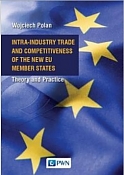| |||||
Strona główna > opis książki
• polskie
• Zamów informacje o nowościach z wybranego tematu • kontakt |
INTRA-INDUSTRY TRADE AND COMPETITIVENESS OF THE NEW EU MEMBER STATESPOLAN W.wydawnictwo: PWN, 2020, wydanie Icena netto: Intra-Industry Trade and
Competitiveness of the New EU Member States Theory and Practice The issues discussed in the monograph are characterised by practical and scientific significance. The analysis carried out by the author is important not only from the point of view of theory, but primarily from the point of view of international commercial practices, in this case intra-industry trade. It is also useful for comparative analyses of the relationship between economies and industries. The study is also important for Poland. The possibilities of intensifying trade with EU partners have clearly increased due to Poland’s participation in the Single European Market. Changes in the economic structure, including, in particular, the modernisation and development of the processing industry, made the Polish economy a good candidate not only to take part in intra-industry exchange, but also to intensify it. prof. dr hab. Elżbieta Czarny (from review) The results of analyses regarding the interrelationship between the intensity of intra-industry trade and the international competitiveness of economies, in particular the new Member States of the European Union (EU-10) against the background of the competitiveness of the “old” EU (EU-15) economies, are rarely presented. The topic of the monograph is important from a practical and scientific point of view. The author presented a new insight and valuable input to the discussion on how to measure competitiveness and the scale of adaptation of economies in the process of liberalisation within the Single European Market. dr hab. Edward Molendowski, prof. UEK (from review) List of abbreviations Introduction Economic competitiveness and intra-industry trade Research objectives and hypotheses Research methods Composition of the publication Data source Contribution to scientific research 1. International economic competitiveness - theoretical aspects 1.1. Introductory remarks 1.2. Economic competitiveness theory fundamentals 1.2.1. The substance and importance of the competitiveness of the nationat economy and the evolution of economic thought and theory 1.2.2. Elements of the international competitive ability of a country - analysis of interrelations 1.2.3. Evolution of the definition of international competitiveness of countries 1.3. Measures of international competitiveness and international competitive positions of economies 1.3.1. Competitiveness modelling - selected methodological aspects 1.3.2. Factors of international competith/eness 1.3.3. Classification and assessment of the main measures of international competitiveness and competitive positions of economies 1.4. Summary 2. Intra-industry trade in the light of theories of international trade 2.1. Introductory remarks 2.2. Fundamentals of the intra-industry trade theory 2.3. Causes of intra-industry trade intensification 2.4. Benefits of the development of intra-industry trade 2.5. Methods of measurement of intra-industry trade 2.5.1. Traditional measures of intra-industry trade 2.5.2. Dynamie analysis - marginal intra-industry trade 2.5.3. Three trade types - a complementary approach to methods of analysing two-way trade flows 2.5.4. Separation of inter- and intra-industry trade flows 2.6. Regional liberalisation of trade and intra-industry division of labour 2.6.1. Intensity of intra-industry trade and trade liberalisation 2.6.2. Structural changes as a result of trade liberalisation and intra-industry specialisation 2.6.3. The role of two-way trade in the convergence of integrating economies 2.6.4. Intra-industry trade and deep economic integration of CEE countries - a review of the most important studies 2.7. Summary 3. Trends in the foreign trade of the EU-10 in 2004-2015 3.1. Introductory remarks 3.2. The main changes of foreign trade conditions resulting from EU accession 3.3. The growing role of foreign trade in EU-10 economies 3.4. Main trends in the dynamies of foreign trade of the EU-10 in 2004-2015 3.6. Similarity of EU-10 export and import structures in relations with the EU-15 and in mutual trade 3.6.1. Exports 3.6.2. Imports 3.7. Specialisation and concentration of exports and imports of NMS 3.8. Summary 4. Changes in the economic competitiveness of NMS after accession on the basis of intra-industry trade indices 4.1. Introductory remarks 4.2. Changes in the intensity of intra-industry trade 4.3. Intra-industry trade in relations with the main groups of partners 4.4. Changes in the structure of intra-industry trade by type 4.5. Indices of intra-industry trade in final goods and intermediaries 4.6. Summary 5. Intra-industry competitiveness of NMS by industry 5.1. Introductory remarks 5.2. Structure of intra-industry trade in manufactured goods 5.2.1. Machinery and transport equipment 5.2.2. Other manufactured goods 5.2.3. Chemicals 5.3. Intra-industry trade in manufactured goods in categories based on technology intensity 5.4. Structure of intra-industry trade in primary commodities 5.4.1. Food, beverages and tobacco 5.4.2. Energy products (i.e. mineral fuels, lubricants and related materials) 5.4.3. Raw materials 5.5. Summary 6. Conclusion and final remarks 6.2. Recommendations for further research List of tables List of charts List of figures Bibliography Bibliography - eleetronic documents Websites Statistical Annex 202 pages, Paperback Księgarnia nie działa. Nie odpowiadamy na pytania i nie realizujemy zamówien. Do odwolania !. |


